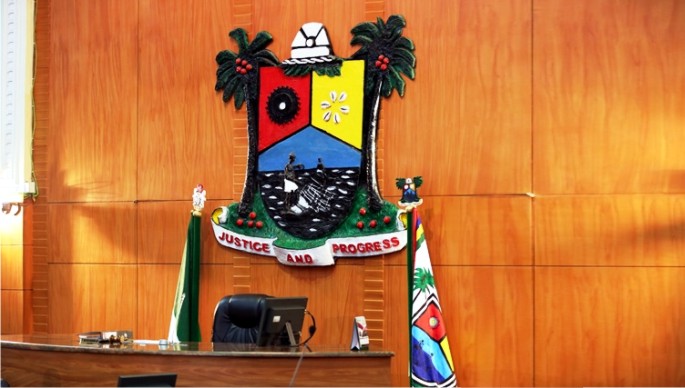Politics
…As Lawmaker Seeks Dialogue To End Xenophobic Attacks

A Lagos State lawmaker, Mr Ajani Owolabi, has called for new dialogue among African countries to end the continents’ socioeconomic infestations, as xenophobic attacks on African nationals in South Africa persists.
Owolabi, representing Lagos Mainland Constituency I in the Lagos State House of Assembly, made the call on Wednesday while addressing newsmen on the latest xenophobic attacks on Nigerians in South Africa.
“I think this is an opportunity for stronger nations in Africa to begin to start forming a new dialogue about how to end this socioeconomic infestation that has plagued Africa.
“We always believe that if a white man comes with the same experience as a black man, we should always trust the white man first, that is a mental chain.
“African nations should come together to address the social issues that we have,” the lawmaker said.
According to him, the only panacea to xenophobic attacks is for the South African Government to address the scars of apartheid evident in the socioeconomic lives of 85 per cent of her citizens.
Owolabi said the incessant attacks on Nigerians was a transfer of aggression by South Africans against foreigners in charge of their nation’s economy.
According to him, 85 per cent of people who are predominantly blacks are worse off economically, but 15 per cent who are foreigners controls the nation’s wealth.
“The country is in a dire strait and they still have extant social issues in terms of the scars that apartheid has left on them.
“I believe a lot of the aggression they are displaying now is a reflection and expression of everything they felt during the apartheid regime,” he said.
Owolabi said that the South Africans’ attack on foreigners, especially the blacks was because they were unable to face the white that controls their economy.
He advised Federal Government to use diplomatic ways to handle the crisis, saying safety of Nigerians should be paramount to the South African Government considering Nigeria’s contributions toward their freedom from apartheid regime.
The wave of xenophobic attacks gathered momentum on Sunday, when a protest march against drug-dealing by local residents in the centre of Johannesburg blamed on immigrants degenerated with shops attacked and looted.
The violence spread to the nearby city of Pretoria, where mobs attacked immigrant traders, workers and shopkeepers on Monday.
South Africa President, Cyril Ramaphosa, had condemned the violence on Tuesday, saying he was calling in ministers with responsibility for security.
President Muhammadu Buhari has also condemned the latest attack and sent a special envoy to the country.
Politics
How Akande Lied Against Me Over Bola Ige’s Case – Ladoja
In a recent interview, Chief Akande also said Senator Ladoja entered a no case submission for the suspects accused of assassinating the ex-Attorney General of the Federation and Minister of Justice.
But the ex-governor has denied the allegation, saying old age has probably affected the memory of the former Osun State Governor to remember what happened during the period.
Senator Ladoja wondered why Chief Akande, who said he knew many things about the assassination that he would not disclose, did not tell the public what exactly surrounded the killing of the former AGF on December 23, 2001.
Senator Ladoja, next in the hierarchy to the Olubadan of Ibadan, said this when speaking with reporters in his Bodija residence in Ibadan.
Speaking in an interview with Edmund Obilo, Chief Akande suggested that Senator Ladoja might have important information about late Chief Ige’s killing.
He alleged that Chief Ige was killed by the government and described his death as a “state murder” — but never affirmed a specific person who committed the crime.
Chief Akande claimed that Senator Ladoja withdrew a case related to the murder that had initially been pursued by his predecessor, former Governor Lam Adesina.
“I was the chief security officer of Osun State at the time, not Oyo State. Lam Adesina was the chief security officer of Oyo State and he went to court and the governor that took over from him, Ladoja, withdrew the case from court. He might be able to tell you more, he might know more than I do know,” Chief Akande said.
“There are many things that die with people. I know Lam Adesina went to court over the matter, and I also know his successor, (Rashidi) Ladoja, withdrew the case. Ask Ladoja; he would know more about Bola Ige’s death”, he added.
The All Progressives Congress (APC) chieftain also expressed regret that ex-governor Adesina had confided in him about certain details he could no longer disclose.
Chief Akande noted that key figures, including the former Oyo state governor, who could have shed more light on the case, had passed away.
“Because there are many things you don’t want to tell the public. I don’t want to tell anybody. Now Bola Ige is dead, and Lam Adesina too is dead, so who will be my witness? Nobody,” he added.
Addressing journalists at his residence in Ibadan, Senator Ladoja described Chief Akande’s claims as false.
He said that the case was pursued up to the Supreme Court during his tenure, and denied ever having withdrawn any charges.
“I didn’t withdraw the case; my government didn’t withdraw any case. The case was even prosecuted till apex court, Chief Akande lied against me. This is not the first time people said he lied; someone like Baba Adebanjo even said he lied in his book.
“We are not all happy as a result of Chief Bola Ige’s death, and we are all concerned about his death. I was very close to Chief Bola Ige while alive”, he said.
In 2016, former President Muhammadu Buhari ordered that the investigation into the murder be reopened, but there has been little progress since.
Politics
Grassroots Governance: Otu Signs Cross River Local Government Amendment Bill Into Law
Governor Bassey Otu of Cross River State has signed into law the amended Cross River Local Government Law, a significant legislative milestone aimed at enhancing grassroots governance and service delivery in the state.
A statement signed by Chief Press Secretary to the governor, Mr NSA Gill, said Governor Otu commended the State House of Assembly for its proactive and people-centered legislative work while speaking at the bill signing ceremony which held at his temporary office in Calabar.
The governor emphasized that the amended law would strengthen representation at the grassroots level and drive meaningful development.
“In no distant time, the difference at the grassroots level will be clear,” the governor assured.
Reflecting on the political landscape, Governor Otu expressed satisfaction with the Assembly’s status as a fully All Progressives Congress (APC) legislature.
He noted that with the party now fully in control, unity and collaboration were imperative to support President Bola Tinubu’s Renewed Hope agenda.
In his remarks, the Speaker of the Cross River State House of Assembly, Rt. Hon. Elvert Ayambem, highlighted the transformative impact of the amendments.
He stated that the revised law would accelerate economic development, encourage broader participation in governance, and enhance service delivery at the grassroots level.
Some of the key amendments to the Principal Law include: Section 4(4) – increases the number of departments from seven to twelve, allowing for a more structured and efficient administration; Section 5(2) – adjustments in percentages of funds allocated to key Ministries, Departments, and Agencies (MDAs) to enhance effectiveness and efficiency; Section 20(1) – entrusts Vice Chairmen of councils with oversight on humanitarian affairs, peace and conflict resolution, border and boundary matters, as well as sports; Section 21, which mandates that all appointments into Executive Councils must reflect Federal Character, ensuring balanced representation.
Sections 22(3) and 22(6) – enhance the offices of the Secretary of Council and the Clerk of the Legislative Council with additional staff; Sections 22(a) and 22(b) – provide for the statutory appointment of up to 50 persons per council and introduce the role of Ward Relations Officers, who will serve as Special Assistants in each Council Ward; as well as elevation of Heads of Local Government Administration (HOLGAs) to now have the same rank as Permanent Secretaries at the state level, recognizing their critical role in local governance.
Politics
Anambra LP Aspirant Advocates Security Details Withdrawal From Politicians
“Knowing this, stakeholders will quickly show commitment to internal security by overhauling the system if they no longer have access to police escorts”.
Speaking during an interactive session with journalists in Awka, the Anambra State capital, Mr Amamgbo said the measure would help the government develop the right strategies to tackle insecurity and make the country safe again.
“It’s either we rise together or fall together. It’s either we provide security for everybody, or we cannot have our own mini-army while everybody else dies.
“The security situation in the country currently requires a law that will make it impossible for security agents to be assigned to wealthy people,” he said.
He advocated an upward review of security votes to governors, especially in states “where insecurity has become so pronounced that people now live in fear and hardly run their businesses or sleep in peace.”
Mr Amamgbo added, “Security votes allocated to governors should not be seen as pocket money. A committee made up of well-meaning citizens, who are professionals in their various fields, should be constituted to handle the funds, ensure proper utilisation, and enforce accountability.”
He also mentioned that Anambra South was worse hit by the prevailing state of insecurity in the country such as kiddnapping, cultism and sit-at-home, among others ravaging the state.
According to him, for several years, Anambra South, particularly Ihiala, Nnewi South, and Orumba South, have been under siege by non-state actors.
“They have turned our once-thriving communities into theatres of war and bloodshed. Our people, who are predominantly traders, industrialists, farmers, and professionals, now live in perpetual anxiety, unable to go about their lawful businesses,” Mr Amamgbo lamented.
He stated that the unfortunate development had led to the destruction of businesses, economic downturn and displacement of families from their ancestral homes.
He also said that the security challenge had broken law and order, with security agencies stretched beyond their limits.
Mr Amamgbo, therefore, called on the state government to step up efforts to flush out criminals in Anambra South.
-
Niger Delta2 days ago
D’Gov Emphasizes Agriculture In Industrialization … Tasks LG Health Authorities On Discipline
-

 Editorial2 days ago
Editorial2 days agoIsrael-Gaza War: Sustaining The Ceasefire
-

 Politics2 days ago
Politics2 days agoTinubu Sticking To ‘Snatch And Grab’ Agenda, Atiku Responds To Presidency
-
Politics2 days ago
Against Governors’ Resolution, Anyanwu Resumes Office At PDP Secretariat
-
News2 days ago
NGO Implants Free Pacemakers Into 22 Cardiac Patients In PH
-
Rivers2 days ago
100 Days: LG Boss Commissions Late Monarch’s Palace Fence, Solar Water Projects
-
Business2 days ago
FG Targets Power Sector Transition To Cost-Effective Tariffs
-
News2 days ago
Monarchs, MOSOP Hail Tinubu Over Ogoni Varsity Approval

